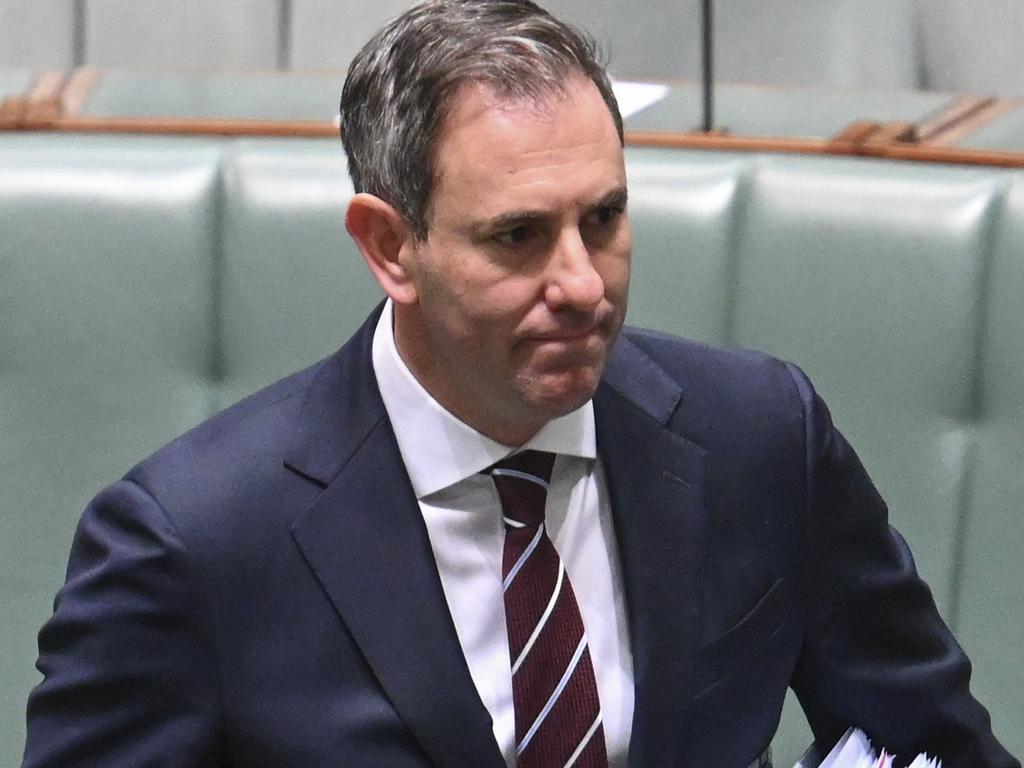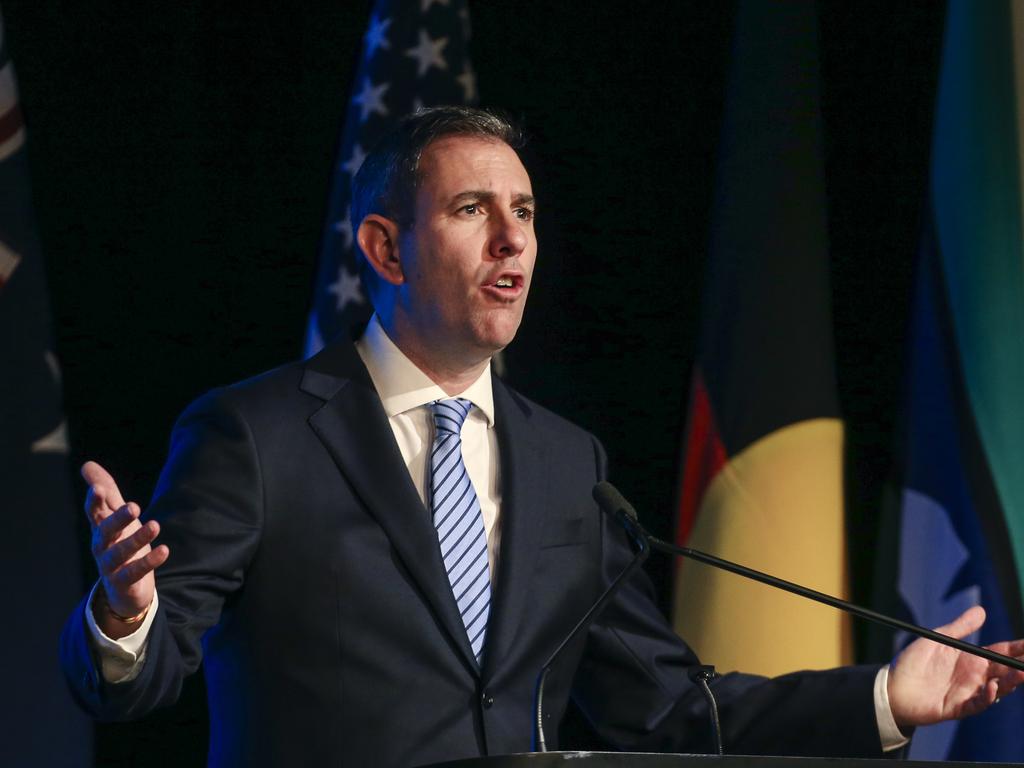All care, no responsibility: Jimbonomics is failing to deliver


It didn’t start well, with the publication of his longwinded essay on reinventing capitalism. The main conclusion to be drawn from this dubious treatise was his lack of understanding of the role of treasurer. The idea that capitalism could be reinvented from the Treasury Buildings in Canberra was completely fanciful.
But more troublesome was his failure to understand the inflation challenge he inherited. Let’s not forget, the Reserve Bank had already begun its transition to higher interest rates and inflation was running well above the target of 2 to 3 per cent per year. Rather than accept the role the government must play in reining in inflation, Chalmers preferred to rely solely on the RBA to do the job, even if it involved a very long period of time before inflation was brought under control.
There was still a belief in some circles – a belief Chalmers held as well – that inflation was essentially the result of international supply shocks associated with the Covid pandemic, and that all would return to normality in due course.
In fact, the reality was much more complicated and inflation quickly assumed a homegrown component with the lingering impact of international factors washing through. Against this backdrop was the dramatic collapse in productivity – not productivity growth, actual productivity – which has inevitably been associated with falling per capita real disposable incomes, a good measure of living standards.
Chalmers’s naive self-congratulation about rising nominal wages misses the point. The key is that real wages can only grow in line with productivity growth, but he has steadfastly refused to implement any productivity-boosting reforms. The fact Australia’s real wage growth is among the worst in the OECD should not come as a surprise.
Instead of focusing on ways of lifting productivity, Chalmers has sat back while other ministers have introduced policies that further harm productivity, most notably on industrial relations, energy and the NDIS. The (misguided) decision to rely on the RBA to bring inflation into line permitted Chalmers to spend up big, having got lucky with the revenue gushing in as a result of higher-than-expected commodity prices and bracket creep-related income tax revenue. The result has been the handing down of two budget surpluses in 2022-23 and 2023-24, outcomes for which Chalmers can take very little credit.

You only have to look at the spending side of the budget to see what is really going on. Last financial year, real government payments grew by 4.5 per cent, coming in at 25.4 per cent of GDP.
This financial year, payments will grow by a further 3.6 per cent, amounting to 26.4 per cent of GDP and an expected deficit of $28bn. The year after that, spending is projected to be 26.6 per cent of GDP, with a deficit of $43bn. Most treasurers would be highly embarrassed by these red-ink forecasts. It’s worth adding here that this year’s budget expired almost without trace very soon after it was handed down.
The size of government has taken a significant step up since the pandemic, an outcome Chalmers has no intention of reversing. Of course, spending on Labor’s pet projects is not hard work and brings praise from caucus. But even here there are signs of budget mismanagement. For example, the cost of extending the parental leave scheme has ended up triple the original estimate.
It’s hard to name an area in which Chalmers has succeeded in implementing any reform. He is big on rhyming alliteration but there is a pattern of failing to follow through. He embraced the crazy idea of delivering a wellbeing budget – New Zealand’s Jacinda Ardern was a fan – only now to ditch it.
He brought forward the release of the Intergenerational Report but nothing came of it. The curious notion of a care economy – one of Chalmers’s favourite terms – ignores the real issue that uncapped social spending threatens to blow up the budget – think here particularly the NDIS, but also aged care and childcare.

Notwithstanding his early announcement to impose higher tax on superannuation balances in excess of $3m, negating an election promise, nothing has been legislated. He doesn’t seem to have any understanding of the technical complications of the proposal.
Apart from the difficulty of dealing with those on defined benefit schemes, there is the fact that industry super funds pay tax at the fund level and generally don’t have the systems to link tax liabilities with individual policy holders. The leap to taxing unrealised capital gains was both rash and ill-considered. The fact is all good treasurers always think through unintended consequences and this proposal is replete with them.
Chalmers’s decision to extend the special GST deal with Western Australia is another example of brazen political self-interest trumping good economics. It was bad enough when Scott Morrison brought in this time-limited arrangement; Chalmers had no qualms about extending it. The fact the Western Australian budget is massively in surplus while most of the other states face fiscal catastrophe doesn’t seem to worry Chalmers.
Then there was the decision to restructure the Reserve Bank by splitting the board into one overseeing monetary policy and the other corporate matters. Having hastily commissioned a report on the matter – it was chaired by a very busy Canadian economist without any local knowledge – Chalmers has failed to make any progress.
Working on the assumption that the split would go through – legislation is required – a search process was initiated and potential candidates for the Monetary Policy Board were approached. This expensive exercise has now been suspended because the legislation has not passed.
It is hard to avoid the conclusion that Chalmers was keen to install his favoured candidates well before the end of the year. The hope was that these new board members would push the case for a quick reduction to the cash rate, an outcome with a positive political upside for Labor. Evidently, maintaining the independence of the Reserve Bank, a key foundation of sound macroeconomic policy, was a secondary consideration for Chalmers.

Chalmers’s ownership of the dubious Future Made in Australia is another black mark against his reputation. As the lobbyists flock to argue for questionable projects that push the right buttons – promoting the renewable energy superpower, in particular – any failures will be seen as the fault of the Treasurer and his ill-equipped department. The idea that Treasury, with its commercially naive and inexperienced officials, can identify strategic sectors is a complete nonsense.
A competent treasurer needs to juggle the government’s priorities while managing to run a responsible budget policy and progress needed reforms. Chalmers does not meet those criteria. He is on the list as yet another politically driven money man with no appreciation of what makes a good treasurer.
The one bit of good news for Labor is that there is some genuine economic talent, albeit largely untested, among its parliamentarians; in particular Andrew Charlton and Daniel Mulino.







As the term of this Labor government approaches its end, it’s worthwhile posing the question: How has the Treasurer, Jim Chalmers, performed? Bear in mind here the Treasurer is the second-most important person in the government.